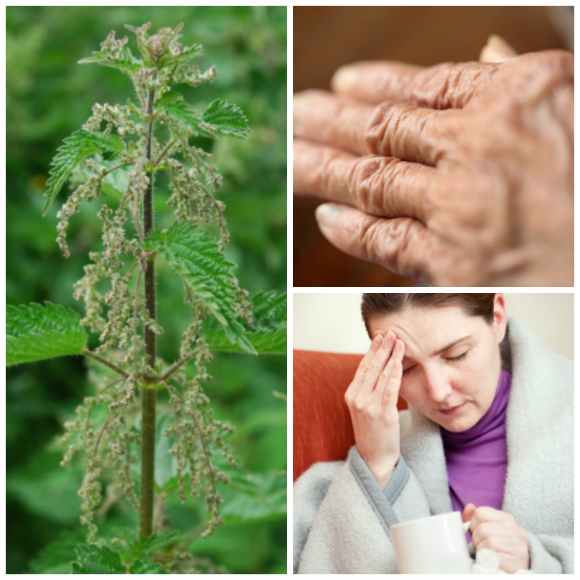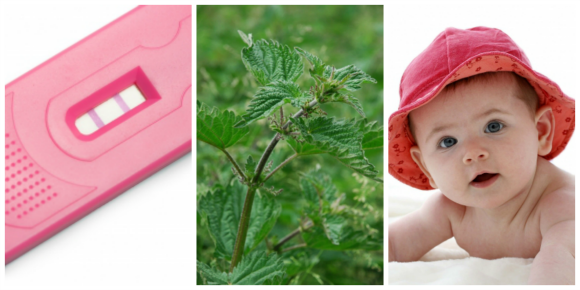If anyone would have told me when I was a child that one day I would eat, enjoy, and purposefully grow stinging nettle — I would have thought they were crazy. Stinging nettle was my nemesis. It surrounded the chicken coop turned play house, it buried the old red truck in the grove that turned into a submarine at the push of a button (really, it did!), and it was something to dodge as we ran out to play in the woods. (Psst. We didn’t have computers back then.)
I hated it. If you were unlucky enough to brush up against it, it stung, burned, and the tingling stayed with you for hours. The reason for its existence was not something I contemplated — because obviously it served no purpose but to scare and annoy me.
I’m so glad learning doesn’t stop at eight years old, aren’t you? 🙂 Otherwise, I would have never come to appreciate all of stinging nettle’s benefits.
What is Stinging Nettle
Stinging nettle is a perennial herb — not a weed. 😉 It grows in colonies and can get up to 8 feet tall, though most I’ve seen around the midwest are 4 to 5 feet tall.
Health Benefits of Stinging Nettle
So what good can come of stinging nettle? Hippocrates, called the Father of Medicine, reported over 60 uses for nettles. They say history repeats itself, so let’s see how it was used in times past:
- Galen, a Greek physician in the second century, knew way back then that it was good as a laxative, for gangrenous wounds, swellings, nose bleeds, excessive menstruation, spleen-related illness, pleurisy, pneumonia, asthma, tinea, and mouth sores.
- In the Dark Ages it was used for shingles and constipation.
- In the seventeenth century it was recommended to use with honey for gout, sciatica, and joint aches.
- Native American medicine claims that if you hit the leaves around painful, arthritic joints, it relieves the pain. That’s not as far-fetched as it may seem. Flogging oneself with fresh nettle, called urtification, stimulates circulation and clears uric acid from the system. It’s said to have been used by Roman soldiers to ease the pain in their legs after long marches in cold and wet climates.
- Ancient Egyptians reportedly used nettle infusions for arthritic and lumbago pain.
(source)
Stinging Nettles for Fertility
Nettles are considered a multi-vitamin by many herbalists because they contain iron, vitamin C, calcium, magnesium, phosphorus, and protein. And for a mother-to-be, nettle holds a special place in her heart (or should) because of its:
- vitamin E — also known as alpha-tocopherol. Tocopherol comes from the Greek words tokos and phero, which literally mean “offspring” and “to bear”. Vitamin E also increases sperm health and motility, helps prevent miscarriages in women with a history of miscarriage, and increases the quality of the amniotic sac, helping to prevent premature rupturing.
- chlorophyll — detoxifies the body and regulates menstruation
- ability to provide nourishment to the uterus
- improvement of the adrenal and kidney functions
Well this is all fine and dandy, you say, but how do you go about using nettles in day to day life? Join us next month for Stinging Nettles Part 2. You’ll discover simple and easy ways to use this God-given herb! Until then I’ll give you a little hint — don’t eat them raw. 😉
Is nettle part of your life or health routine? What benefits does it bring you?
We only recommend products and services we wholeheartedly endorse. This post may contain special links through which we earn a small commission if you make a purchase (though your price is the same).

 (
( (
(

Hehe, that did grow naturally along the bush near my childhood farm. It guarded the wild elderberry bushes that I had to reach…. I have lots of experience of what the skins thinks of this one! *grin*
I know this sounds crazy, but I have been looking around in abandoned lots and in our yard for stinging nettle but I haven’t been able to find any. Is there a place that you know of that sells seeds?
Thanks!
Hi Lindsey,
I’ve never bought them myself, but a quick Google search for ‘stinging nettle seeds’ came up with these options:
Mountain Rose Herbs (type ‘nettle seeds’ in search box)
Rare Seeds
Local Harvest
Mountain Rose Herbs is a fantastic resource.
So is Jean’s Greens out of Schodack, NY (www.jeansgreens.com)
-Nicole
Great for allergies and inflammation.
I use nettles to relieve my allergy symptoms!
It makes delicious soup!
Allergies and chest colds/cough
If your new to nettles, take it easy at first. Trust me. 😉
I use nettle as 1/3 of the mix in a daily infusion that I prepare. I use it mainly for the minerals.
I have always heard nettle was “the herb” for hair. Is this true? It wasn’t mentioned in the article!
I have always heard nettle was “the herb” for hair. Is this true? It wasn’t mentioned in the article!
That and bone broth!
I was just enjoying my nettle tee with my breakfast! Healthy and when you get used to it it actually taste really good too. I get the tee from my European family, it is a common tee there.
My mom cured her hay fever with nettle tee. She would pick them fresh and make a tee, than she would drink the tee in slips over the whole morning. It really helped her a lot.
I love nettles for allergies, anemia, and general well-being. I add them to my daily herbal infusion.
Better than spinach, works great dried and used in home made facial scrubs, and tea is good too! I have some growing myself!
I have lots of stinging nettle, but don’t know what to do with it.
I brew nettle and mint tea overnight to enjoy every day. Love it!
I take the freeze dried supplement right now.
I use it every fall for allergies and dry it for adding to soups and smoothies and tea in the winter. It’s also great just as a cooked green to stretch the budget, and has more minerals and goodness than spinach.
I do nettle! yummy soup
I eat nettles raw, put them in smoothies w/ avocado, lemon, garlic and salt. Water or yogurt. Yummy and an incredible spring tonic.
I LOVE nettle and just got back into relating to it, and I’m so glad. I just harvested wild nettle and am drying it in my basement for tea all through the winter. I wrote about it in a recent post on my healthy lifestyle blog:
http://www.healthcrafting.com (click blog on left side)
thanks bt it also reduces stabilises pressure, diabets, also snake bites neutralise poisonous toxins of insects and many others.